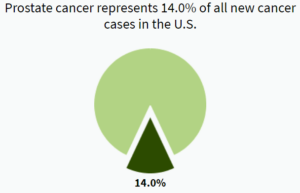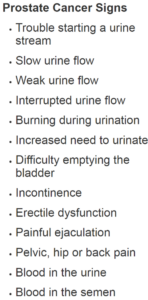
Obese men have a higher risk of getting aggressive prostate cancer. But obesity can also cause problems with the initial screening process.
Researchers investigated the relationship of height and weight on the development of prostate cancer as well as death from this disease.
When people think of the health risks of obesity, most usually think of any of the following:
- Heart disease
- Heart attack
- Obstructive sleep apnea
- High blood pressure
- Type 2 diabetes
- Knee replacement surgery
But obesity is quite relevant to prostate cancer.
A study involved about 150,000 male subjects. Over a 14 year period their data was analyzed. At the end, 7,024 were diagnosed with prostate cancer.
• 726 were aggressive tumors
• 934 deaths total
Average age at diagnosis was 67.8, and the age range was 41 to 95.
Height, Weight and Aggressive Prostate Cancer
For every 10 centimeter increment in a man’s height, the risk of aggressive prostate cancer jumped by 21 percent, and mortality risk spiked by 17 percent.
Obesity was also found to be a risk factor. Needless to say, keeping a healthy body weight lowered both risks.

seer.cancer.gov/statfacts/html/prost.html
Why is obesity a risk factor in prostate cancer?
Overweight men are less likely to be diagnosed with early prostate cancer.
“Meta-analyses of existing data suggest that obese men are at higher risk of aggressive prostate cancer and a failure of treatment (surgery and radiation),” says Matthew Allaway, DO, a urologist who specializes in detecting prostate cancer and the developer of a prostate biopsy technique that improves cancer detection.
“Potential causes include the increased challenge of screening, insulin/insulin growth factor, sex hormones and adipokine signaling factors.
“Of interest, obese patients often have low testosterone levels, which have been linked to more aggressive prostate cancer.”
Obesity can hinder detection of the disease because overweight men tend to have larger prostates.
Plus, “Conducting a prostate specific antigen (PSA) test in combination with a digital rectal exam (DRE) is the standard process in diagnosis of prostate cancer before a biopsy is performed,” begins Dr. Allaway.
“It is more challenging to perform these tests in obese men because it is more difficult to actually feel and find their prostates.”
The problems with obesity don’t end as yet. Dr. Allaway also explains, “Obesity leads to increased aromatization (the process that converts testosterone into estrogen), causing estrogen levels to rise and testosterone levels to drop.
“Low testosterone has been linked to increased risk of aggressive prostate cancer.”

The full report, regarding the connection to obesity with prostate cancer, is in BMC Medicine (2017).










































